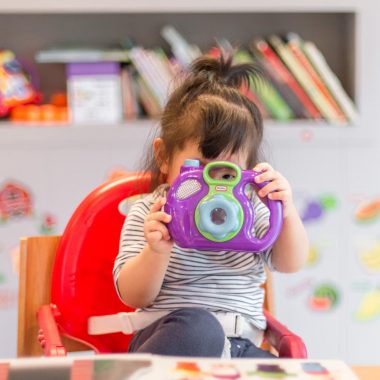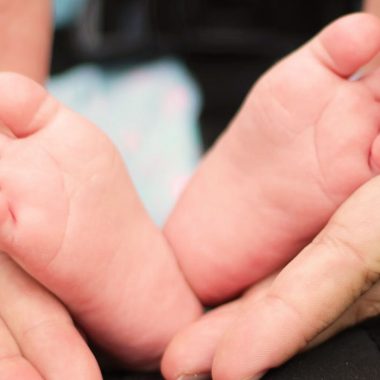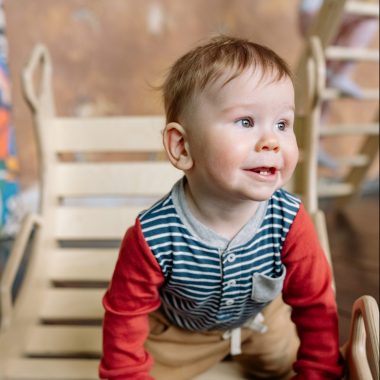If you’ve ever searched for “signs of low intelligence in babies,” you’re not alone. Many parents worry about their baby’s development, especially when comparing milestones with other little ones. It’s natural to wonder if your child is on track, learning at the right pace, or showing early signs of intelligence. But here’s the thing, intelligence in babies isn’t measured the way we think.
Rather than focusing on IQ or traditional intelligence, pediatric experts look at cognitive, social, motor, and language development to track a baby’s growth. Some babies reach milestones earlier, while others take more time, and in most cases, variations are completely normal. However, there are times when delays in certain areas may indicate a need for early intervention.
It is important to remember that a delay does NOT equate to a lack of intelligence. Every baby grows at their own pace and in many cases, early intervention helps close these gaps alongside encouraging healthy development.
Recognizing signs of developmental delays (and when to be concerned), and the different factors that impact brain development are crucial for every new parent. Moreover, understanding the difference between low intelligence and developmental delays can greatly affect how you approach raising your little one.
We will dive into the signs to look out for and also discuss important differences parents need to learn. We will also tap into the different technologies, like Invidyo, that can assist with tracking and supporting your baby’s development.
What Does “Low Intelligence” Mean In Babies?
Before diving into specific signs, it’s important to understand what “low intelligence” really means. Perhaps it would be even better to know what it doesn’t mean. Unlike adults, intelligence in infants isn’t measured through IQ tests or academic performance. Instead, pediatricians and child development experts assess a baby’s cognitive, social, motor, and language skills to gauge their growth.
Low Intelligence vs. Developmental delays: What’s the difference?
Many parents worry that missing a milestone means their baby has low intelligence, but the reality is more complex. Some babies take longer to reach certain developmental stages, and that doesn’t necessarily mean they have permanent cognitive challenges.
To put it plainly,
- Developmental Delays: When a baby is slower to reach a milestone (such as sitting up, making eye contact, or responding to their name), it may simply mean they need more time or stimulation to catch up. Many of these delays resolve on their own.
- Intellectual Disability (IDD): If a child shows persistent delays across multiple areas of development, such as cognition, motor skills, communication, and social interaction, it may indicate an intellectual or developmental disorder (IDD). However, IDD cannot be diagnosed in infancy alone as doctors track growth patterns over time.
ALSO READ: My Baby Isn’t Gaining Weight – What Should I Do?
The primary focus in either situation is your baby’s brain development. When it comes brain development, there are several factors that influence your baby’s intelligence and cognitive skills.
- Genetics – Some babies naturally develop faster or slower due to inherited traits.
- Prenatal Health – Proper nutrition and avoiding harmful substances during pregnancy support healthy brain growth.
- Early Stimulation – Talking, singing, and interactive play encourage cognitive development.
- Nutrition & Sleep – A well-fed, well-rested baby has a stronger foundation for learning.
- Medical Conditions – Premature birth, infections, or certain genetic syndromes can sometimes impact early development.
By understanding what contributes to a baby’s learning ability, parents can focus on providing the right support rather than worrying too soon.
Signs of Developmental Delays in Babies
Now that we’ve established that intelligence in babies is best understood through developmental progress rather than fixed IQ, let’s take a closer look at potential signs of cognitive, motor, and social delays. It’s important to remember that babies develop at their own pace, and a delay in one area does not automatically indicate a serious issue. However, persistent delays across multiple areas may be a reason to seek guidance from a pediatrician or child development specialist.
Some of the areas within which your baby might be struggling with include:
Cognitive and Problem-Solving Delays
Cognitive skills involve how babies think, learn, and interact with their surroundings. Early signs of concern can look like:
- Not tracking objects with their eyes by 3 months
- Lack of interest in new sounds or visual stimuli
- Not reaching for objects by 6 months
- No curiosity about cause-and-effect actions, such as dropping a toy to see what happens
- Struggling to recognize familiar faces or objects by 9 months
Social and Emotional Delays
Babies naturally seek connection with caregivers and express emotions through facial expressions, eye contact, and vocalization. Some early red flags include:
- Lack of smiling or facial expressions by 3–4 months
- No interest in making eye contact with caregivers
- Limited response to familiar voices or no effort to engage socially
- No signs of separation anxiety or attachment behaviors by 9–12 months
ALSO READ: 7 Myths and Facts About Autism Every Parent Must Know
Speech and Language Delays
While babies don’t speak in full sentences early on, they begin cooing, babbling, and making sounds to communicate. Some warning signs include:
- No babbling or cooing by 6 months
- Lack of response to their name by 9 months
- No gestures such as pointing, waving, or clapping by 12 months
- No words or sound imitation by 12–15 months
Motor Skill Delays
Physical development is another key area to monitor. Delays in gross or fine motor skills can sometimes indicate developmental concerns. Potential signs include:
- Floppy or overly stiff muscle tone
- Not lifting their head by 3 months
- Not rolling over by 6 months
- Not sitting unassisted by 9 months
- Not attempting to crawl, pull up, or stand by 12 months
Attention and Awareness Issues
A baby’s level of engagement with their environment can also provide insight into their cognitive development. Possible concerns include:
- Not turning toward familiar sounds by 6 months
- Low interest in surroundings or difficulty staying focused on a caregiver’s face
- Appearing disengaged or passive for extended periods
These signs don’t necessarily mean a child has an intellectual disability, but they can be early indicators of a need for additional support. Identifying these challenges early allows parents to seek professional guidance and provide the right interventions.
ALSO READ: When Will My Baby Start Laughing?
What Causes Developmental Delays?
There are many reasons why your little one can experience developmental delays. But again, they are not an indication of permanent cognitive impairment. Some delays are temporary and need some time to go away on their own. Other delays require intervention and signal to an underlying concern.
This is why it is important for parents to recognize the different causes of developmental delays. If you approach these delays with the right tools and a proactive mindset, you’ll be far better equipped to assist your little one.
Some common causes of developmental delays include:
Genetic and Neurological Factors
- Some delays may be linked to genetic conditions such as Down syndrome, Fragile X syndrome, or metabolic disorders.
- Neurological conditions such as cerebral palsy can impact motor skills and overall development.
Prematurity and Birth Complications
- Babies born before 37 weeks may take longer to reach milestones due to underdeveloped organs, muscles, and nervous systems.
- Complications at birth, such as lack of oxygen (hypoxia) or low birth weight, can also impact early cognitive and physical development.
Environmental and Nutritional Factors
- Lack of stimulation, such as limited interaction, play, or exposure to language, can slow cognitive and speech development.
- Nutritional deficiencies (such as iron or iodine deficiency) can affect brain development and energy levels.
ALSO READ: Does Independence Increase Infant Intelligence?
Hearing or Vision Impairments
- Babies rely on their senses to learn, and undiagnosed hearing or vision problems can lead to delayed responses to social cues, speech, and environmental awareness.
- If a baby does not respond to loud sounds or fails to make eye contact, a pediatric hearing or vision screening may be recommended.
Chronic Health Conditions
- Conditions such as epilepsy, congenital heart disease, or recurrent infections can sometimes contribute to slower physical and cognitive growth.
While there are several indications that hint at developmental delays which may contribute to low intelligence in babies, the most striking indication that you need to visit a pediatrician is when your child exhibits persistent delays across multiple areas.
You can consult your pediatrician if you start noticing:
- No eye contact or social engagement by 3–6 months
- No babbling or response to familiar voices by 9 months
- Lack of motor progress, such as no rolling over by 6 months or no sitting by 9 months
- Regressing in skills they previously mastered (e.g., losing language or motor skills)
- Extreme difficulty focusing on objects or people
ALSO READ: How To Spot Medical Complexities In Children?
Why Early Intervention Matters
The good news? Delays don’t always mean permanent struggles. The brain is highly adaptable in infancy, meaning early stimulation, therapies, and interactive learning can help most babies catch up. The key is monitoring progress and taking action if needed.
Many developmental delays can be addressed effectively if identified early. Pediatricians, occupational therapists, and speech therapists can provide strategies, therapies, and exercises to support a baby’s progress. The earlier these interventions begin, the more opportunities the child has to build strong cognitive, motor, and social skills.
Technology, like Invidyo’s AI-powered monitoring system, can help parents track developmental progress and detect early signs of concern.
How Invidyo Helps Parents Track Developmental Progress
Invidyo’s AI-powered monitoring system offers a comprehensive solution that goes beyond traditional baby monitors by providing insights into your baby’s behavior and developmental milestones.
Real-Time Monitoring and Analysis
Invidyo continuously tracks key aspects such as sleep patterns, movement, and responsiveness. By capturing these details, the system can help you identify subtle changes or trends that might indicate developmental delays. e.g. if your baby’s sleep becomes unusually disrupted or if there’s a noticeable change in their activity levels.
Sleep Tracking
Quality sleep is crucial for brain development and overall growth. Invidyo’s sleep tracking feature uses AI technology to monitor your baby’s sleep patterns, including the exact times they fall asleep, wake up, and experience periods of wakefulness.
With comprehensive sleep summaries and detailed graphs that display sleep durations and cycles, you can easily identify changes or disruptions in your baby’s sleep routine. This information is invaluable for understanding how well your baby is resting and whether adjustments might be needed to support their developmental progress.
Cough & Cry Analysis
Monitoring patterns in crying and coughing can provide valuable insights into your baby’s overall health and developmental progress. Invidyo’s AI-driven analysis records, summarizes and tabulates episodes of crying and coughing, presenting the data in easy-to-understand daily summaries and weekly graphs.
This detailed analysis allows you to detect unexpected trends or changes in your baby’s behavior, ensuring that you can seek professional advice if necessary.
Data-Driven Trends for Early Intervention
One of the key advantages of Invidyo is its ability to compile and analyze historical data. Over days, weeks, and months, you can see trends in your baby’s development. If certain milestones are consistently delayed or if there’s a significant shift in behavior, these insights can serve as an early warning system.
ALSO READ: 6 Ways Invidyo Makes Parenting Easier
While Invidyo is not a diagnostic tool, its comprehensive monitoring provides parents with a sense of reassurance. Knowing that you have a system in place to track your baby’s developmental progress can help you stay proactive. Early detection of potential delays means you can seek professional advice sooner, allowing for timely interventions that can make a significant difference in your child’s developmental journey.
By integrating these features into your daily routine, Invidyo empowers you to keep a close eye on your baby’s developmental milestones. The system’s data-driven insights can help you recognize subtle changes early, enabling timely interventions and more informed discussions with your pediatrician.
Frequently Asked Questions About Developmental Delays
Q: Are there signs of low intelligence in babies?
A: Many parents search for “signs of low intelligence in babies,” but intelligence in infancy is complex and not easily measured. Instead of focusing on IQ, experts recommend tracking developmental milestones in areas like language, problem-solving, and motor skills.
Q: How can I tell if my baby is experiencing developmental delays?
A: Monitor your baby’s progress in key areas like eye tracking, smiling, babbling, and motor skills (such as rolling over or sitting up). Consistent delays across several of these domains, or a regression in previously acquired skills, may indicate that further evaluation by a pediatrician or developmental specialist is needed.
Q: Does a delayed milestone mean my baby has low intelligence?
A: Not necessarily. Babies develop at different rates, and some simply take longer to reach certain milestones.
Q: Can developmental delays be improved with early intervention?
A: Yes, many developmental delays can be effectively addressed with early intervention strategies. Therapies, targeted stimulation, and a nurturing environment can significantly support a baby’s progress. Early detection, often aided by monitoring tools like Invidyo, allows you to seek professional guidance and implement supportive measures sooner.
Q: How do I support my baby’s cognitive growth?
A: Engaging in talking, reading, tummy time, and interactive play all help stimulate brain development. Responsive parenting, exposure to new experiences, and a structured sleep routine can all support learning.
So, the big question of “what are signs of low intelligence in babies?” does not quite have a direct answer. When it comes to babies, IQ isn’t measured the way it is in adults. It’s important to understand that early developmental milestones reflect a range of cognitive, motor, social, and language skills, not a definitive intelligence quotient.
There are several factors that contribute to a baby’s cognitive growth. By paying close attention to your baby’s progress and seeking professional guidance when needed, you can ensure that your little one receives the support they deserve. Tools like Invidyo further empower parents by providing daily summaries, smart notifications, smile and memory capturing, and comprehensive sleep tracking. These features not only help you monitor your baby’s development but also offer actionable insights to catch subtle changes early.
Remember, every baby grows at their own pace. Embracing the journey with vigilance, love, and the right support can make all the difference.









